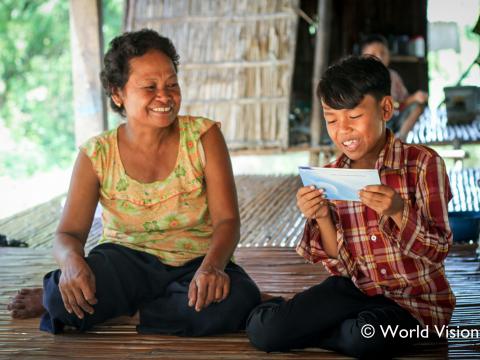A Child and His Sponsor's Letter

Talking with his mother on a bamboo bed in their house, Sophan suddenly gets off the bed and walks outside to welcome Onn, World Vision’s children facilitator in the community.
With a smiley face, Sophan knows that Onn must have brought his sponsor’s letter to him. He is right! It is a bounce back card, with Christmas greetings and a calendar sent by his sponsor.
“Barbara (Sophan’s sponsor) blesses me Christmas day. I feel that she seriously cares about me,” says Sophan after reading the letter for his mother.
With a shy face, Sophan says that he wants to know more about his sponsor’s family, the number and name of her children, and how they are doing.
“I want to tell her that I am fine. My parents are farmers. How about you? What are you doing in America?,” says Sophan.
“Please send me more letters,” says Sophan when asked what he wants to add.
Onn has worked with over 500 children for eight years. Through sponsors’ letters, the children receive encouragement and it shows love to the children, says Onn.
“I can see they (sponsored children) are very happy when they receive the letters. For those who don’t receive it, they look so sad,” continues Onn.
Sophan, 11, is the third outstanding student in the class. Since he is good at Mathematic, he wants to be a teacher in his school.
World Vision has been working in Leuk Daek Area Development Programme since 2000. According to Onn, recruiting sponsored child is difficult for now compared to the past-a flashback to the period when community people faced a lot of issues before World Vision entered the community.
“Before, when I visited children, parents complained about shortage of food and the sickness of children as well as lacking medical service,” says Onn, adding that now, most of the parents have jobs and can support children schooling. They have enough food to eat and can bring their children for medical service.
“World Vision has contributed to educate our villagers on hygiene and restore water reservoirs, which help to increase crop yields two to three times higher than previous time. Consequently, our farmers have better living condition,” says Onn.
“I can say that the community people have better knowledge in term of hygiene. Their houses are clean. Ninety per cent of them have toilets at home. They drink boiled water. They know about law and they send their children to go to school at the age of 6 years old,” says Onn.